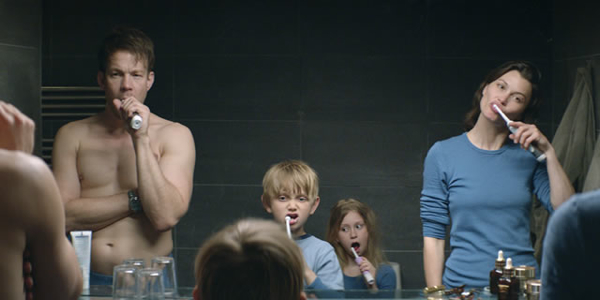Movie review by Greg Carlson
Gender, class, marriage, and parenthood receive a good working over in Ruben Ostlund’s hilarious “Force Majeure,” a gorgeously photographed dream/nightmare vacation travelogue that smartly deploys a human-versus-nature leitmotif to situate the First World problems of its protagonists within a conversation about control, self-control, and our lack thereof. More preoccupied with the variety of ways in which males can come undone when their sense of masculinity is challenged than it is with the inner lives of the women who deal with these manchildren, the movie nevertheless finds ways to engage psychologically with both husband/father Tomas (Johannes Bah Kuhnke) and wife/mother Ebba (Lisa Loven Kongsli) when their union is threatened.
The catalogue model-ready Swedes, along with their lovely children Vera and Harry (played by brother and sister Clara and Vincent Wettergren), arrive in the French Alps for a relaxing ski getaway at a luxurious resort. Immediately, Ostlund hints at something ominous beneath the surface of the postcard chalet and its network of high-tech chairlifts and groomed downhill runs. Cutting between observations of the family at play and Vivaldi’s “Summer”-scored master shots of controlled detonations and the sights and sounds of the various equipment and machinery required to manage and maintain a premium experience on the slopes, Ostlund demonstrates masterful, even diabolical, restraint.
When one of those controlled detonations threatens to send an avalanche into the laps of the relaxing vacationers while they enjoy lunch on an outdoor terrace, Tomas panics and runs away from his family. The moment passes quickly. Everyone is shaken but safe. But something in Tomas’ failure to look out for his loved ones unsettles Ebba and readies the conflict that defines Ostlund’s primary agenda. The director encourages his viewers to laugh at the foolish and ridiculous Tomas (a sustained scene of comically intense, pathetic sobbing and wailing is one showstopper), but Ostlund resists simplification by making room for us to wonder how we, regardless of age or gender, might have reacted in a similar situation.
One of the ways in which Ostlund accomplishes this objective is through the addition of handsome, leonine Mats (Kristofer Hivju) and the younger Fanni (Fanni Metelius). The late-night, alcohol-fueled conversation shared by the couples leads to battle lines being drawn, especially after Mats does his best to come up with a reasonable defense of Tomas. Mats puts his own standing with Fanni in jeopardy, and a follow-up scene in which Mats and Tomas are flirted with pulls the rug out from under the aging dads. By contrast, Harry’s fears that his parents may be headed for divorce are not presented by Ostlund as a laughing matter.
Ostlund withholds enough to keep the viewer invested in the slow burn disintegration of Tomas’ role as respected authority figure, although a pair of motifs might have merited deeper exploration. One incorporates a watchful, taciturn hotel employee who silently observes the comings and goings of Tomas and Ebba. The other, in which Ebba engages with a free-spirited woman who argues against monogamy, hints at untapped possibilities to dig deeper into Ebba’s inner life. Amazingly, Ostlund refrains from holding his characters in contempt, asking instead, how well do we really know one another? And how hard might it be to forgive something taken for granted? These questions, and others, are unanswered by the movie’s enigmatic final sequence, another unexpected jolt of potential peril that at first seems to mirror the inciting avalanche but also furnishes something resembling hope.
